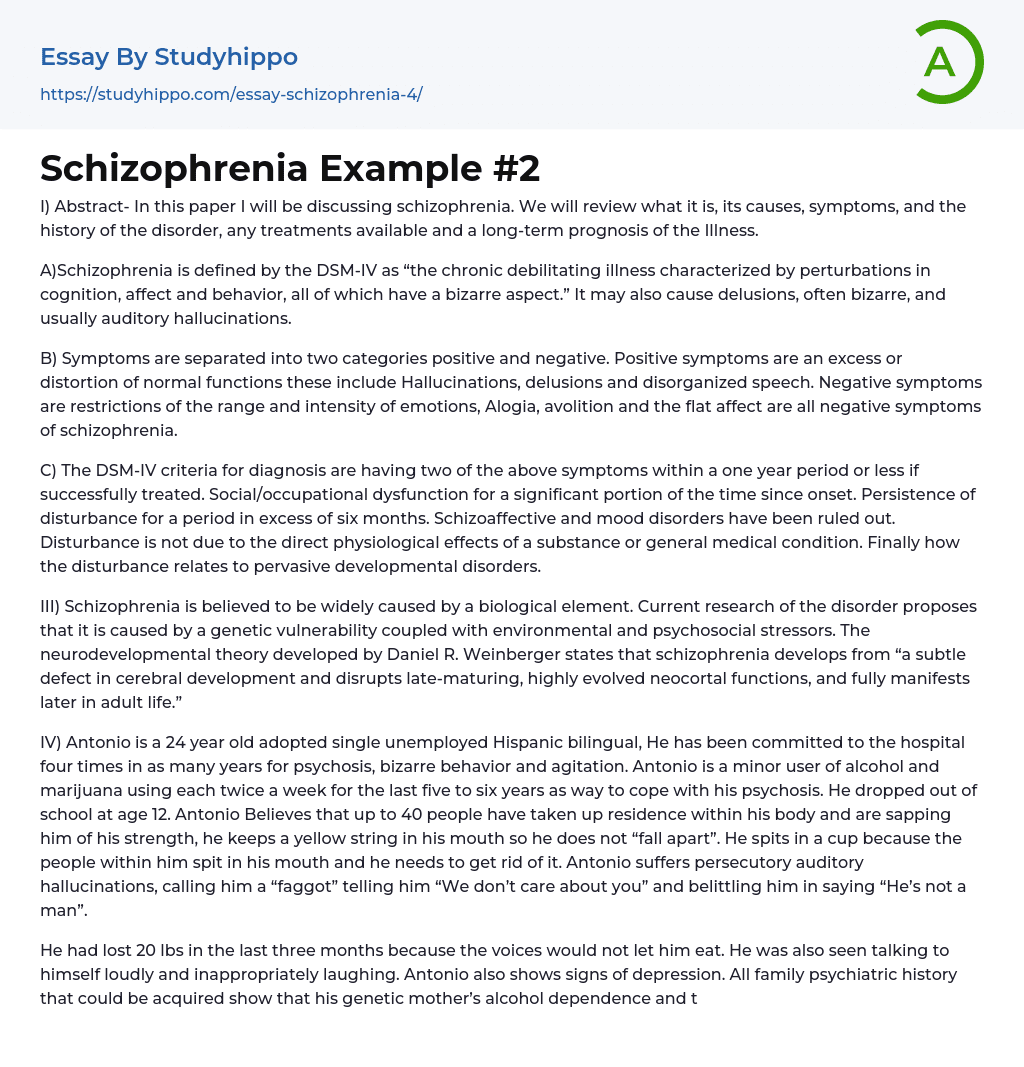This paper will examine various aspects of schizophrenia, such as its definition, causes, symptoms, disorder history, available treatments, and long-term prognosis.
Schizophrenia, as defined by the DSM-IV, is a long-lasting and incapacitating disorder marked by cognitive, emotional, and behavioral abnormalities that can often seem peculiar. This condition may also lead to unusual delusions and auditory hallucinations.
B) Schizophrenia symptoms can be categorized into positive and negative. Positive symptoms involve an excess or distortion of normal functions, which include hallucinations, delusions, and disorganized speech. On the other hand, negative symptoms restrict the range and intensity of emotions and consist of alogia, avolition, and a flat affect.
To meet the DSM-IV criteria for diagnosis, an individual must show two or more symptoms within a year (or shorter if treated). There should also be noticeable social/oc
...cupational dysfunction since the symptoms started, lasting for over six months. It is important to exclude schizoaffective and mood disorders, as well as disturbances caused by substances or medical conditions. Furthermore, one should consider any possible link between the disturbance and pervasive developmental disorders.
III) Schizophrenia is believed to occur due to a combination of genetic vulnerability, environmental factors, and psycho-social pressures. According to Daniel R. Weinberger's neurodevelopmental theory, this disorder arises from an impairment in brain development that specifically affects the late-maturing advanced neocortical functions, which become fully apparent during adulthood.
IV) Antonio, a 24-year-old unemployed Hispanic bilingual, has been hospitalized four times in the past four years due to psychosis, unusual behavior, and restlessness. To cope with his psychosis, he occasionally uses alcohol and marijuana, consuming both substances twice a week for the pas
five to six years. Antonio left school at 12 years old. He strongly believes that approximately 40 individuals have taken over his body and are draining his energy. In order to prevent himself from "falling apart," he keeps a yellow string in his mouth. Antonio also spits into a cup to remove the saliva of the people inside him. Additionally, he experiences persecutory auditory hallucinations where voices insult and demean him.
In the past three months, he lost 20 lbs due to the interference of voices, preventing him from eating. Moreover, he exhibited behaviors such as speaking to himself loudly and laughing inappropriately. Antonio also displays symptoms of depression. The available family psychiatric history suggests that his birth mother had alcohol dependence, which resulted in neglect and abandonment. This background may have contributed to his profound anxiety surrounding his adoption. Despite his efforts to gain acceptance from the staff after being committed, he struggled to fully comprehend and implement the explanations and recommendations given.
Family therapy and assertive community treatment have demonstrated efficacy in preventing relapse and rehospitalization in individuals with psychosis. However, their impact on other outcome measures may vary. Social skill training has been found to enhance social interactions among patients, although its effect on relapse rates is uncertain. Supportive employments following the place and train model have resulted in better employment outcomes. Personal therapy may also improve social functioning. Anti-psychotic drugs have been available since the mid-1950s, and a significant number of patients taking these medications experience notable improvement.
Although Risperidone and Olanzapine are considered safer than Clozapine, their effectiveness is uncertain. In contrast, Clozapine has higher efficacy but
may cause Agranulocytosis. While anti-psychotics are generally effective for treating hallucinations and delusions, they may vary in their ability to reduce motivation and emotional expressiveness.
VI) The long term prognosis of schizophrenia cannot be determined due to the reliance on clinical definitions of end states. However, the extreme end states of schizophrenia can provide some insight into the long term prognosis. These end states include full remission or characteristic residues within a narrower scope, such as total unemployment, simple courses to mixed residues, or typical schizophrenic defect psychoses. It is crucial to have more reliable definitions of these end states in order to obtain a more accurate long term prognosis.
- Insanity essays
- Adhd essays
- Antisocial Personality Disorder essays
- Anxiety essays
- Bipolar Disorder essays
- Depression essays
- Depression And Anxiety essays
- Dyslexia essays
- Learning Disability essays
- Major Depressive Disorder essays
- Mental Disorder essays
- Mental Illness essays
- Psychosis essays
- Schizophrenia essays
- Stress essays
- Suicide essays




